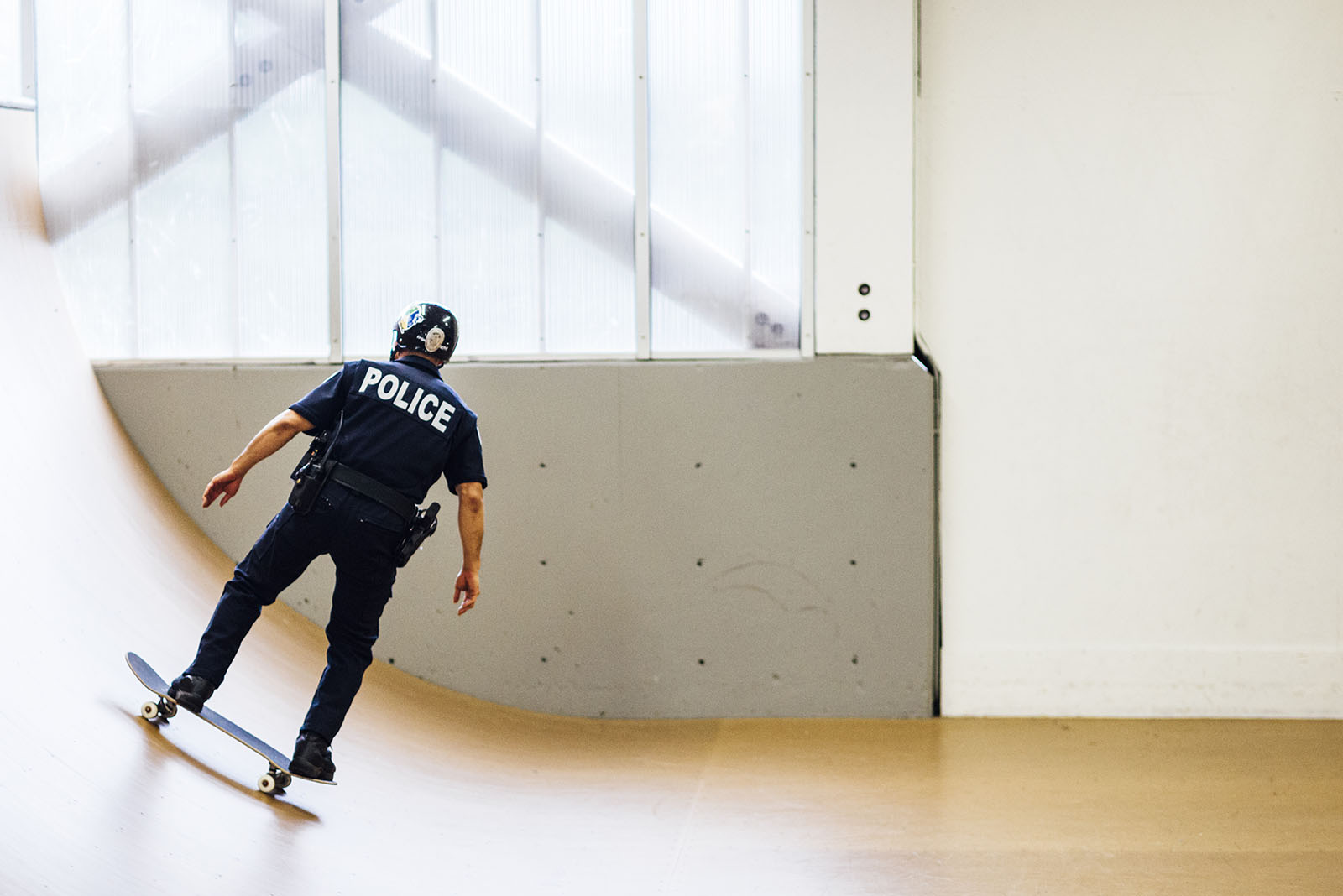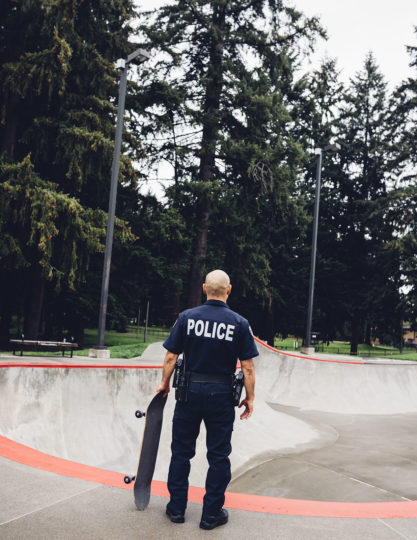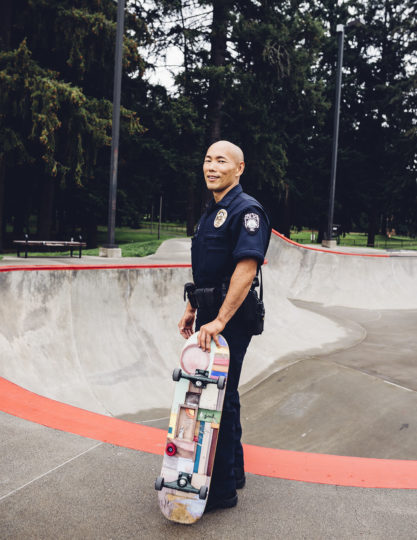Images by IJfke Ridgley
Officer Craig Hanaumi likes to joke that of any job, police officers have the closest one to being Batman. “We have a car that has special equipment, we have a uniform with armor and a belt full of tools, and we get to fight crime,” Hanaumi says. “There’s no other job like that.”
But the masked vigilante and blue-clad law enforcement officers share more similarities than gadgets and goals. Both face intense scrutiny, tend to keep their personal identities private, and are seen as enforcers of the law. They’re defined by their uniforms, not who they are underneath.
In recent years, Hanaumi has worked to combat this by “humanizing the badge,” he says. Today, the Bellevue police officer uses his personal interests and hobbies to redefine how the community perceives him, creating personalized forms of outreach in his Washington community. News outlets such as Today and ABC News have featured him as the “skateboarding cop,” presenting atypical coverage of a police officer. The 42-year-old visits skateparks, schools, and community centers and shares it on his Instagram with an audience of 34,000 followers, creating relationships in person and over social media. “It’s neat to see good acts every once in a while,” Hanaumi says. “Because [the media] is usually just negative stories, which is unfortunate.”
Back on Oʻahu, the ʻAiea High School graduate patrolled District Four, which spans Kahuku to Waimānalo, after joining the police force in 2003. While he had been attracted to the job for its promise of job security, its wages weren’t enough for him to ignore Hawaiʻi’s rising cost of living. In 2006, Hanaumi moved to Washington after being hired by the Bellevue Police Department. On May Day, which made him think of lei, he learned of protests in Seattle. In the Northwest, the day had long been marked by demonstrations for labor rights, but that year there was a heavy focus on police brutality. He was surprised by the anti-police sentiment and militaristic response.
As he acclimated to his settings and settled into his community, Hanaumi learned of the four city-run skate parks. This news of a thriving skate scene excited the police officer, who had lived and breathed the sport in his childhood. The classic skate film The Search for Animal Chin featuring the iconic trio the Bones Brigade—Tony Hawk, Steve Caballero, and Mike McGill—engrossed Hanaumi when he was 10 years old. The film featured Wallows, a gulch in O‘ahu’s Niu Valley, which gave him every reason to assume a skater persona. But increasing amounts of time spent in school and at work put his skateboard into retirement.
It wasn’t until 2015 that he decided to return to the familiar landscape of concrete and Masonite slopes. He hadn’t skated for nearly two decades, but praises of Bellevue’s four skate parks increased his longing to get back on the board. Not wanting to draw attention, he visited Bellevue Indoor Skate Park one evening after work, during the park’s slower hours. To his relief, only an employee and a 6-year-old were there. The pair greeted the uniformed police officer with some confusion, since cops were usually only present for events or camps. When Hanaumi asked if he could join the action, their confusion became skepticism. Assuming Hanaumi had no experience, Akash Rishi, the worker on duty, handed over the necessary skate equipment and began to instruct him on the basic skating stance: Stand on the bolts, bend your knees, stay low. Hanaumi dropped in on the ramp with ease.

Impressed, Rishi asked for a picture with Hanaumi to post on Instagram. “Seeing the amount of positivity that came out of Akash’s reaction, I thought ‘I can use this activity as an outreach,’” Hanaumi says. “And then I realized there are camps here with two dozen kids coming out for a week at a time. Every single one of those kids probably has never had any interaction with the police, and their first one can be of me skateboarding with them.”
From then on, Hanaumi kept a skateboard in his police car. “Anything done in uniform gets more notice,” he explains. “But I’m the same person whether in uniform or not. It’s just weird to see an officer doing normal things, because people aren’t thinking officers are human beings or have hobbies.” When given slower work assignments in mellow areas, Hanaumi experimented on his skateboard, which drew curious observers, as he hoped. He also teaches jiu jitsu at community centers like the YMCA and Boys and Girls Clubs as part of his job as a police officer. In his spare time, he continues to hone his skating skills, and he also volunteers teaching students low-brass instruments at Tillicum Middle School. He is almost always in uniform.



